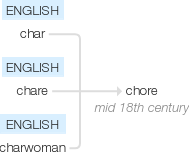Chore
mid 18th century (originally dialect and US): variant of obsolete char or chare (see charwoman).
wiktionary
From earlier char, from Middle English charr, charre, cherre(“odd job, turn, occasion, business”), from Old English ċerr, ċierr(“a turn”), from ċierran(“to turn”), from Proto-Germanic *karzijaną(“to turn”), from Proto-Indo-European *gers-(“to bend, turn”).
Cognate with Dutch keer(“time; turn; occasion”), German Kehre(“a turn; bend; wind; back-flip; u-turn”). Also related to Saterland Frisian kiere, käire(“to turn”), Old Saxon kērian, Old High German chēran(“to turn”) (German kehren(“to turn”), Dutch keren(“to turn”)). See also char.
Possibly derived from Romani ćor(“thief”), see also Geordie word chor.
chore (plural chores)
etymonline
chore (n.)
"a small job or task," especially "a piece of minor domestic work of regular or frequent recurrence," 1751, American English, variant of char, from Middle English cherre "odd job," from Old English cerr, cierr "turn, change, time, occasion, affair business." Related: Chores.
Chore, a corruption of char, is an English word, still used in many parts of England, as a char-man, a char-woman; but in America, it is perhaps confined to New England. It signifies small domestic jobs of work, and its place cannot be supplied by any other single word in the language. [Noah Webster, "Dissertations on the English Language," 1789]
